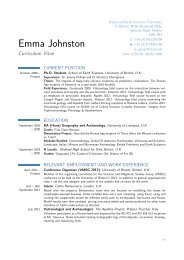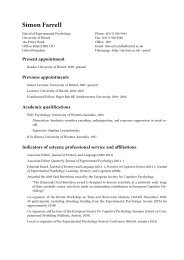What is Scientific Progress?
What is Scientific Progress?
What is Scientific Progress?
You also want an ePaper? Increase the reach of your titles
YUMPU automatically turns print PDFs into web optimized ePapers that Google loves.
methodologically careful h<strong>is</strong>torian but they are true nonetheless. If the h<strong>is</strong>torian’s explanations are<br />
to be neutral between real<strong>is</strong>m and anti-real<strong>is</strong>m, they should be neutral about progress as well as<br />
truth.<br />
By invoking a notion of progress, Kuhn breaks th<strong>is</strong> strict neutral<strong>is</strong>m. In the Postscript to the second<br />
edition of The Structure of <strong>Scientific</strong> Revolutions he goes further by attacking the concept of truth<br />
in a version of an argument familiar from Kant and others. The argument <strong>is</strong> that a ‘correspondence’<br />
conception of truth entails sceptic<strong>is</strong>m (Kuhn 1970, 206). 15 If the truth of statement S <strong>is</strong> a matter of<br />
its matching the fact F, then knowing that S <strong>is</strong> true <strong>is</strong> a matter of knowing that there <strong>is</strong> th<strong>is</strong> match.<br />
That in turn requires access to the fact F independently of the statement S—knowledge requires<br />
considering S and F separately and seeing that they match. But where S <strong>is</strong> a scientific theory, any<br />
access we could have to the facts such as F <strong>is</strong> only via theories such as S. So knowledge <strong>is</strong> not<br />
possible. (Kuhn takes th<strong>is</strong> to show that the correspondence theory <strong>is</strong> incoherent. But that only<br />
follows if sceptic<strong>is</strong>m <strong>is</strong> incoherent.)<br />
Th<strong>is</strong> argument <strong>is</strong> confused in a number of ways. For the present the following should be sufficient<br />
commentary. 16 Kuhn does not explain, nor does anyone else who employs the argument, why<br />
access to F needs to be independent of S, let alone prior to knowledge that S <strong>is</strong> true. The truth of S<br />
may cons<strong>is</strong>t in its matching F. But it does not follow from th<strong>is</strong>, that knowledge of the truth of S<br />
requires unmediated knowledge of that matching. Why cannot knowledge of the matching be<br />
mediated (for example, by inference)? We might think that the matching between S and F <strong>is</strong> the<br />
best explanation of the truth of propositions deduced from S. Or we might think that the fact that F<br />
<strong>is</strong> the best explanation of certain other facts. From which we infer that F ex<strong>is</strong>ts, from which we in<br />
turn infer the truth of S.<br />
29






